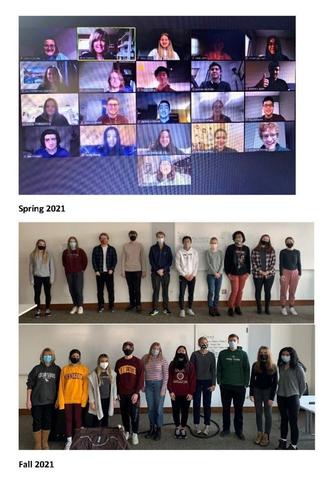The possibility of something good: Acknowledging the silver linings in the most challenging times

According to Merriam-Webster, when we say “every cloud has a silver lining”, we mean that every bad situation holds the possibility of something good. As of this writing, COVID-19 deaths include 1.01 million people in the U.S., and 6.33 million people worldwide. For those mourning loved ones, the thought of a silver lining associated with this pandemic may be unimaginable. For others; however, particularly those working on the front line of COVID-19 response, it’s important to reflect on the lessons learned, as well as the things for which we should be grateful. I recently asked members of the Health Emergency Response Office (HERO) team to share their professional and personal “pandemic silver linings.” Here are their responses:
Professional Silver Linings
- The scale and severity of the pandemic meant that we had to employ interventions that have now served as practice for just about any other outbreak, epidemic or pandemic.
- The critical relationships built as a result of this response will strengthen all our response efforts going forward to all events.
- Working in public health has never been more important. I'm so grateful I'm in a field where people work hard and care about what they do.
- We witnessed rapid adoption and norm-shifting about remote work. It went from being a luxury to a necessity and in the end it seems many places (including the University) have found a healthy balance of using it to support employee work-life needs while remaining productive and connected as a team.
- This pandemic has been the learning experience of a lifetime as a public health student.
- I don't know if I would call this a silver lining, or just a glimmer of hope, but it was nice to see individuals and industries shift to meet needs (for example, the whole cottage industry for masks, or the distilleries who made hand sanitizer). It's not unique to this disaster, but it was reassuring to know that people will still try to find ways to play a part and rise to the occasion.
- The response highlighted the skills and expertise of the HERO team and members of the U of M Medical Reserve Corps (MRC), including the valuable role they serve for the university.
- Seeing how willing our MRC members were to step up and volunteer during this challenging time makes me so proud to be a part of the MRC and the University of Minnesota in general.
- We had the opportunity to work with amazing people and create new partnerships.
- We had an opportunity to review and implement improved operational efficiencies in our work.
- The importance of valuing your work. Working with good colleagues in an area that you value makes things easier. While staff were at high work/high stress levels, knowing that we’re providing some small level of support and important/relevant information for colleagues and the general public, made me feel proud that we were contributing to society. I’ve heard from a number of people who said they had to re-evaluate their career path during the pandemic, but for me it just made me realize that I love working in public health & emergency response.
Personal Silver Linings
- We experienced greater flexibility in work-life balance and also had the opportunity to editing our lists of what is most important.
- The importance of self-care has been acknowledged and reinforced over the last two years. It’s vitally important to take time to take care of yourself and your loved ones. Even if you don’t have vacations planned to go somewhere special, just taking time to disconnect and recharge batteries (whether going to a park, a stroll through nature, day trips, etc.).
- Less time commuting has meant more time to prepare dinner. I've really been able to venture out and try new, more complicated recipes.
- Because we didn't travel to large family gatherings out of state the last couple years, my husband and I were able to enjoy holidays with just the two of us. As much as we missed our families, it was still a really special and relaxing time to make our own traditions.
- The pandemic has highlighted the importance of family and close friends. They not only provide perspective and advice, but helped in different situations (providing physical and emotional support). Attempting to survive the last two years without them would have been significantly harder.

I’ll end this Director’s Update by adding three of my own high level “silver bullets” to this list:
- Public health has been center stage: Often solidly “behind the curtain,” public health professionals and public health strategies were on center stage for an extended period of time. Governors were seen on television explaining epidemiology curves and contact tracing to their constituents
- We have been reminded of the need for humility: With the glare of the spotlight, came the reality that many people do not trust science, public health leaders, and traditional tried and true public health strategies. The work become two parts public health decision-making and operation and two parts explaining and defending those decisions and operations. The experience reminds us of the need to remain humble and reach people where they are, not where we think they should be. Some might say the problems began when public health became political. In the current environment in our country, we must also remember that everything is political.
- We have witnessed our individual and collective ability to adapt as teachers, learners, workers, and families: The human ability at be flexible was evident in so many arenas. Nowhere was that more evident than in the courses offered by HERO and the Center for Infectious Disease Research and Policy. These images capture the new realities for our students as we moved from various course modalities over the past many months.
I often told my student they were living through a period of time when public health history was being made. When I was a student, I experienced the beginning of the HIV/AIDS epidemic, and it changed the course of my career. Mid-career, I experienced the terrorist attacks on September 11, 2001 and the subsequent bioterrorism attacks through the mail. Those events also changed my career. Today’s students will forever be impacted by the COVID-19 pandemic. Working with them, discussing their ideas and concerns, has been one of the biggest “silver linings” for me as I know the future is in good hands.